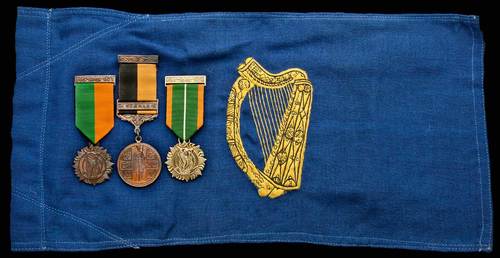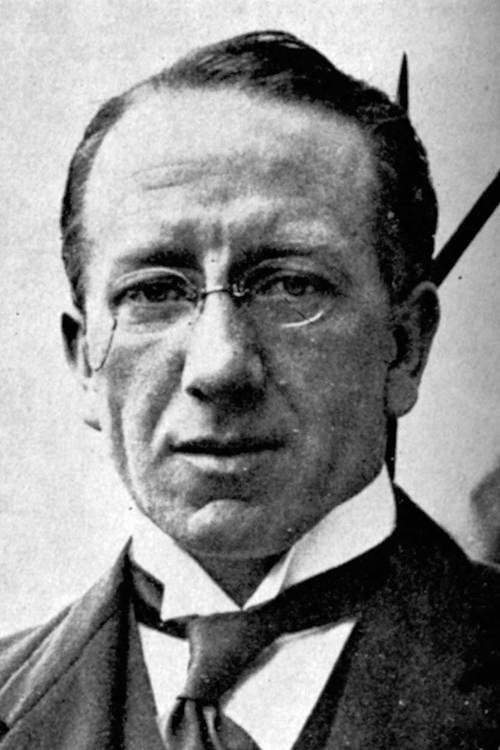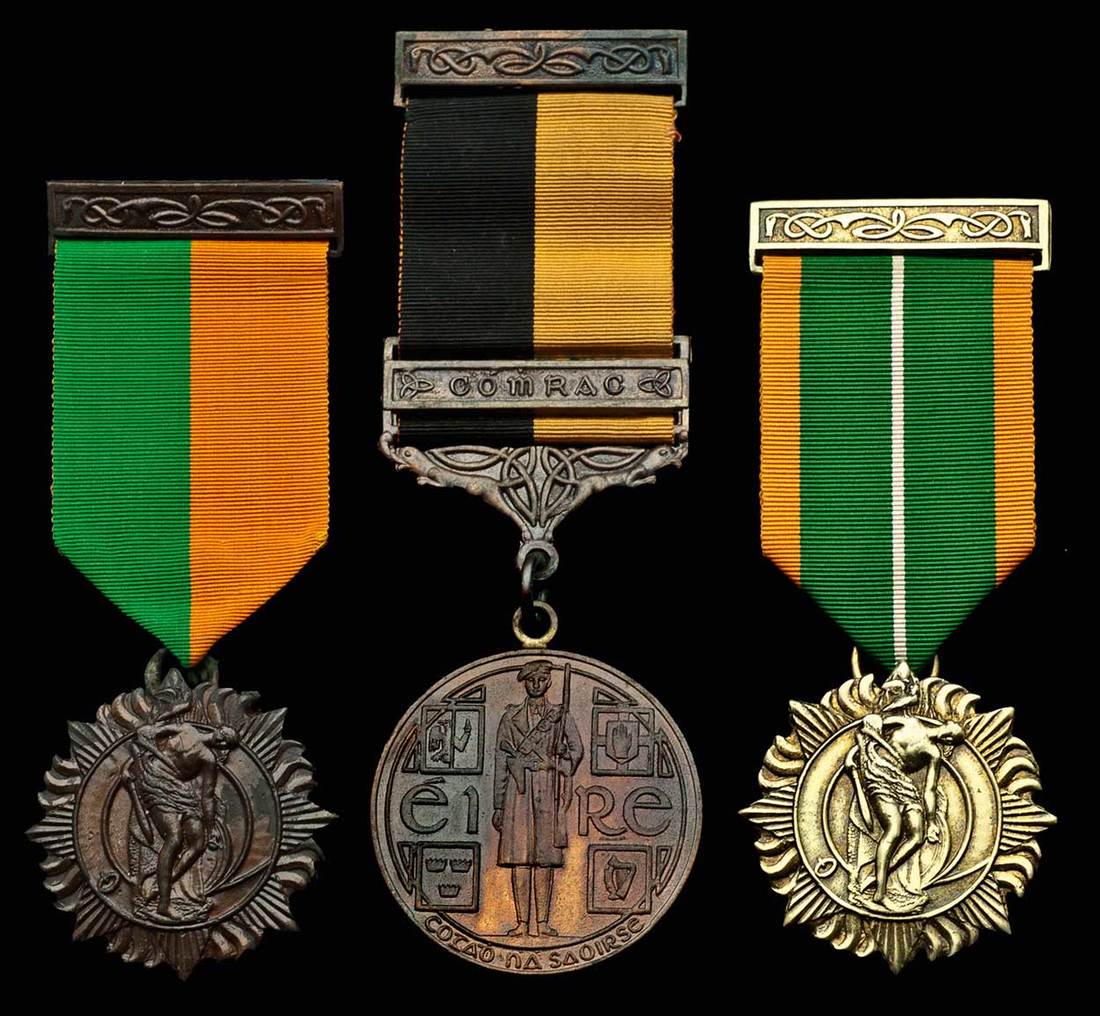Auction: 323 - The Numismatic Collector's Series Sale
Lot: 731
A 1916 Medal Group of Three Attributed to Sean O'Kelly, Irish Volunteers, Who Served During the 1916 Easter Rising as Patrick Pearse's Staff Captain with the General Post Office Garrison; He Subsequently Served as President of Ireland, 1945-59
1916 Medal, unnamed as issued, with General Service Medal 1917-21 top riband bar; General Service Medal 1917-21, combatant's version with Comrac Bar, unnamed as issued, with integral top riband bar; 1916-66 Easter Rising Anniversary Commemorative Medal, silver-gilt (Hallmarks for Dublin 1966), unnamed as issued, with integral top riband bar, good very fine, with the following related items:
- The recipient's Presidential car pennant, a gold harp on a St. Patrick's blue field
- A presentation gold (9ct) table medal, the obverse featuring a semi-detached house within a wreath, the reverse inscribed (in Gaelic) 'Presented to Sean T. O'Kelly, T.D., Vice President of the High Council and Minister for Local Government and Public Health, when he turned the first sod at Villa Park in Cabra, Dublin, at the invitation of the Local Council for the Tram and Bus Workers on the 19th October 1935.', in Weir and Sons, Dublin case of issue
- The recipient's lapel riband with miniature Star emblem of the Federal German Order of Merit (3)
Sean Thomas O'Kelly was born in Dublin in August 1882, and educated at the Richmond Street Irish Christian Brothers School. He joined the National Library of Ireland as a junior assistant in 1898, and the same year joined the Gaelic League. In 1905 he joined Sinn Fein at its inception, becoming honorary secretary of the movement in 1908, and remained in the post until 1925. In 1906 he was elected to the Dublin Corporation. In 1915 he went to New York, to inform Clann Na nGaedheal of the plans for a rising in Dublin by the Irish Volunteers. Patrick Pearse appointed O'Kelly to be his Staff Captain in preparation for whenever the insurrection would take place.
Easter Rising
'On Monday morning [of Easter Week 1916] I was out of the house early, stopped at my office, stopped to see my mother, and about 11 o'clock made my way to Liberty Hall. A crowd was there, milling around in general confusion. I saw Pearse. He asked if I was with him, and I said yes. Then James Connolly said to form up, and a small column of us marched to the General Post Office. And the Easter Rebellion of 1916 was under way.
Once inside the Post Office we were, at first, a little bewildered. James Connolly started giving orders. He asked to have the building cleared of all the Post Office officials, then he ordered some of the men to knock all the windows out of the building and have them sandbagged. Meanwhile I had been standing around, waiting to be of service to Pearse, wondering what I was to do. Connolly saw me and told me to go to Liberty Hall. There I would find a large parcel wrapped in brown paper; in the parcel were two flags, one a green-orange-and-white tricolour, and the other an all-green flag with a gold harp in the centre. I was to bring him these two flags. I did as Connolly told me, and when I handed him the flags he called over someone standing by and ordered him to hoist the flags on two flagpoles on the roof of the G.P.O. building. And with this, Commandant-General Connolly had become Commander of the Republican Forces in Dublin.
Sometime after we had occupied the G.P.O. we received word that a company of British cavalry was advancing on O'Connell Street. Thirty or forty men were sent out to form a line across the street and intercept the British. In a few minutes we saw a column of Lancers galloping into O'Connell Street, the crowd that had been milling about in front of the Post Office scattered and took cover in the side streets, several shots rang out, and then we saw the Lancers retreating in confusion, in all directions, having left a few of their men and some of their horses behind lying on the pavement. Later in the day, some three or four hundred people gathered in front of the G.P.O. to hear Commandant-General Pearse read aloud the Proclamation of the Republic. When the reading, and the determined cheering that attended it, was finished, Connolly called me over, and ordered me to take copies of the Proclamation and have them pasted up around the city. I collected a few idle men and we posted about two hundred Proclamations through the streets of Dublin. And thus can it be said that I had my part in making known the Republic.' ("We Ourselves", the recipient's account of the day, refers).
After the Easter Rising O'Kelly was taken prisoner and held at Richmond Barracks, before being removed to Wandsworth Detention Barracks on the 2nd June 1916. Released at Christmas, he returned to Ireland, and was re-arrested on the 22nd February 1917 and deported. He escaped from detention in Fairfield in Britain, and returned to Ireland. Elected Member of Parliament for Dublin College Green in the 1918 British General Election, he, along with other Sinn Fein MPs, refused to take his seat in Westminster. Instead they set up an Irish Parliament, called Dail Eireann, in Dublin, with O'Kelly serving as Speaker. He also served as the Irish Republic's envoy, demanding recognition of the Republic and its admittance to the post-Great War peace treaty negotiations at Versailles, and sending a memorandum to the Pope. Opposing the Anglo-Irish Treaty signed in December 1921, O'Kelly spent most of the Civil War in prison, before serving as Sinn Fein envoy to the United States, 1924-25. In 1926 his political mentor Eamon de Valera left Sinn Fein to found his own republican party, Fianna Fáil. O'Kelly followed him, becoming one of the party's founding members. In 1932, having won that year's General Election, O'Kelly was appointed Minister for Local Government, and in 1939 was promoted to Minister of Finance. Elected President of Ireland in 1945, on Easter Monday 1949 he became Head of State of the Republic of Ireland, and was elected unopposed to the presidency for a second term in 1952. Described as a "model President" on his retirement in 1959, he died, without issue, in November 1966, shortly after the 50th Anniversary of the Easter Rising, and is buried in Glasnevin Cemetery, Dublin. After his death a significant portion of his personal belongings, including his Irish medals, were sold by public auction.
Estimate
$12,000 to $15,000









